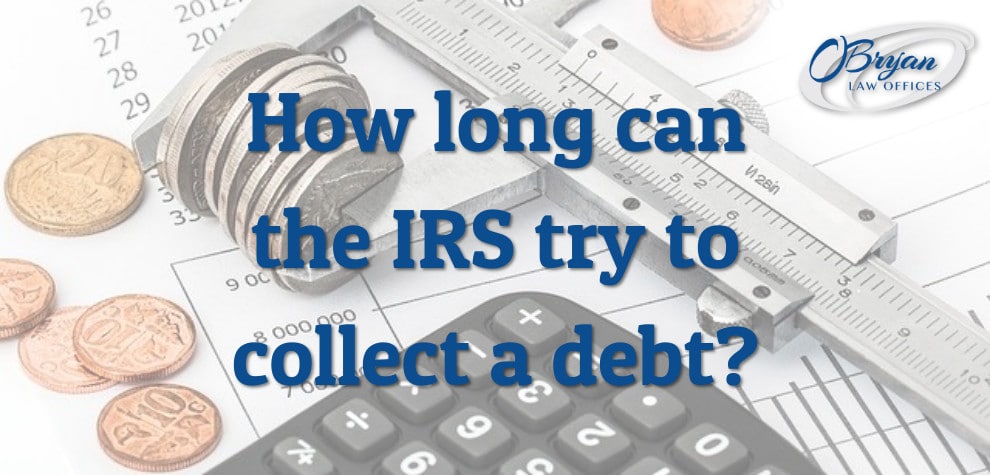The IRS typically has ten years from the date your tax debt is assessed to collect unpaid taxes. This time frame, called the Collection Statute Expiration Date (CSED), may be extended only if you agree to an installment plan or a court judgment allows continued collection. At O’Bryan Law Offices, we guide clients through these time limits to protect their finances and secure lasting recovery.
For personalized guidance on dealing with IRS collections, call (502) 339-0222 to speak with an experienced Louisville bankruptcy lawyer. Our team is ready to help you protect your rights and move toward financial stability.
IRS Collections Statute of Limitations
In general, the IRS may try to collect debt from you for up to 10 years from the assessment date. With very few exceptions, the IRS must stop any and all collection efforts once that 10 year mark comes around. If your CSED is coming up, the IRS will likely increase their efforts to collect payments from you.
As an example, let’s say that you did not pay in full when filing your tax return. The IRS sends you a notice of what you owe. Whatever date is on that bill begins your 10 year period. Similarly, let’s say that you didn’t file a tax return. The IRS will create a substitute return for you, and make an assessment. The date on this assessment starts your 10 year period.
Can the IRS Collect Debt After 10 Years?
The 10 year period of IRS debt collection we mentioned above has some very important exceptions. Whether your limitations period is suspended or if you voluntarily extend your limitations period, it is possible for your CSED to be more than 10 years away. This means that the IRS will have a longer period of time to attempt collection.
Suspensions:
One possibility behind your IRS debt collection period outlasting 10 years is a suspension. During suspension periods, the IRS legally cannot take collection action against you. Therefore, these suspension periods do not count toward your 10 year statute of limitations.
For example, maybe you file for bankruptcy in Louisville. The court may issue a stay, which prevents the IRS from attempting to collect from you. The suspension period in this case may last for the entirety of the bankruptcy, plus an additional 6 months.
Your 10 year period may also be suspended if the IRS considers your request for a compromise, an installment plan, innocent spouse relief, or if you live outside the U.S. for at least 6 months. Rarely, your 10 year period might encounter suspension if the IRS attempts to sue you.
Extensions:
Sometimes, the IRS may try to convince you to extend your limitations period. In the past, the IRS might have threatened an individual into an extension. Luckily, this practice has been illegal since 1998. They can, however, find other ways to make this happen.
For example, if a taxpayer agrees to an installment plan, the IRS might require a waiver of the 10 year limitations period. This extension does not exceed 6 years, but that is still 6 more years of collection opportunities than the IRS had originally.
As your CSED approaches, the IRS is more likely to offer initially appealing installment plans to taxpayers, especially if they still owe a significant amount. To avoid pressure from the IRS, always speak with an experienced tax attorney before making a decision.
How to Find Your CSED (Collection Statute Expiration Date)
If you want to know when the IRS will stop trying to collect taxes, you can find your Collection Statute Expiration Date (CSED) on your IRS account transcript. The IRS statute of limitations generally gives the agency 10 years to collect unpaid taxes from the date they were assessed. To check your CSED, log in to your IRS online account or request a transcript by mail using Form 4506-T.
Knowing when your CSED expires helps you plan your next steps and avoid unexpected IRS actions. For help reviewing your transcripts or resolving tax debt before the clock runs out, call (502) 339-0222 to speak with an experienced Louisville bankruptcy lawyer at O’Bryan Law Offices today.
IRS Miscalculation of CSED and How to Dispute It
Sometimes the IRS miscalculates your Collection Statute Expiration Date (CSED), which can lead to incorrect assumptions about how long they can collect taxes. Errors may occur if the agency fails to account for tolling events, such as bankruptcy or pending installment requests, or if your filing date was entered incorrectly. Checking your transcript helps you confirm whether the collection statute of limitations is accurate.
If you suspect a miscalculation, you can:
- Request a detailed IRS account transcript to review all assessment and suspension dates.
- Contact the IRS in writing to dispute the error and provide documentation of the correct timeline.
- Seek help from a tax professional to ensure the IRS can no longer pursue collection once the true expiration date passes.
Using the 10-Year Limit Strategically for Settlement Leverage
Knowing how the collection statute of limitations works can help you plan smarter when dealing with IRS debt. As the 10-year period to collect taxes nears its end, the IRS often becomes more open to negotiation. You may have leverage to settle your debt for less, especially if you:
- Are close to your Collection Statute Expiration Date (CSED).
- Plan to file a return or correct old filings that affect your tax timeline.
- Want to explore an installment plan or offer in compromise before the IRS can no longer legally pursue the balance.
Before making any decisions, speak with an experienced Louisville bankruptcy lawyer at O’Bryan Law Offices. Call (502) 339-0222 to learn how the 10-year limit could work in your favor and find the best way to resolve your tax deb
Impact of Unfiled Returns, Audits, Refunds, and Fraud
Certain situations can change or even eliminate the 10-year IRS statute of limitations for collecting taxes. If you fail to file a return, the statute never starts, meaning the IRS can pursue the debt indefinitely. Similarly, audits, tax refunds, or fraud investigations may pause or reset the collection statute of limitations, giving the agency more time to collect.
Key examples include:
- Unfiled returns: The 10-year clock doesn’t begin until a valid return is filed.
- Audits: May extend the time frame if additional taxes are assessed.
- Refund claims: Must be made within three years of filing, or they expire.
- Fraud or evasion: Removes the limitation entirely, allowing the IRS to collect at any time.
Partial Payment Installment Agreements (PPIA)
A Partial Payment Installment Agreement allows taxpayers to make smaller monthly payments on their IRS debt until the collection statute of limitations expires. Once the 10-year period ends, the IRS can no longer collect the remaining balance, effectively forgiving what’s left. This option can be helpful if you can’t afford to pay your full tax debt within the collection window.
To qualify for a PPIA, you typically need to:
- Prove financial hardship with income and expense documentation.
- Stay current with future tax filings and payments.
- Reconfirm your financial situation every two years, since the IRS may increase payments if your income rises.
IRS Collection Actions: Garnishments, Levies, and Seizures
When the IRS attempts to collect unpaid taxes, it can use powerful enforcement tools such as wage garnishments, bank levies, and property seizures. A garnishment allows the IRS to take part of your paycheck directly from your employer, while a levy permits the agency to withdraw funds from your bank account. In extreme cases, the IRS may even seize assets like vehicles, real estate, or other property to satisfy tax debt.
If you’ve received a collection notice or fear losing your income or assets, call (502) 339-0222 to speak with an experienced Louisville bankruptcy lawyer. The team at O’Bryan Law Offices can help you understand your rights, stop aggressive IRS actions, and protect your financial future. If you’ve received a collection notice or fear losing your income or assets, call (502) 339-0222 to speak with an experienced Louisville bankruptcy lawyer. The team at O’Bryan Law Offices can help you understand your rights, stop aggressive IRS actions, and protect your financial future.
What to Do Next If You’re Nearing the 10-Year Mark
If your collection statute of limitations is close to expiring, the right next step depends on your financial situation and how much you still owe. Reviewing your Collection Statute Expiration Date (CSED) helps you decide whether to negotiate, wait, or take protective action before the IRS can no longer collect. Acting strategically now could prevent enforcement actions like levies or garnishments.
Here’s a quick summary of your possible next steps:
| Situation | Action to Consider | Goal |
|---|---|---|
| You can't afford to pay your full balance | Request a Partial Payment Installment Agreement (PPIA) | Pay less until the 10-year period ends |
| Your CSED is less than a year away | Evaluate settlement options or wait for expiration | Avoid overpaying before time runs out |
| You're unsure when your CSED ends | Check your IRS transcript or speak with a tax professional | Confirm the date and avoid surprises |
| You received new IRS notices | Review them immediately and respond quickly | Prevent enforced collection actions |
👉 State Tax Statute of Limitations
While the 10-year rule applies to federal tax debts, many states have their own statutes of limitations for tax collection. For instance, Kentucky often follows federal timelines but may extend them in certain cases, such as unpaid state income taxes or unfiled returns. Being aware of both federal and state deadlines helps ensure you’re fully protected from future collection actions.
For More Questions, Contact O’Bryan Law Offices Today
If you feel overwhelmed by your debts to the IRS, our Kentucky debt counseling lawyers are here to help. At O’Bryan Law Offices, our goal is to provide you with compassionate client service. Our experienced tax attorneys have all the understanding you need to get back on your feet.
In addition to helping you navigate your debt to the IRS, we have a wide variety of other practice areas, such as mortgages, foreclosure, and even small business restructuring. If you’re in need of legal financial advice, contact O’Bryan Law Offices today. Fill out our online intake form or give us a call at 502-339-0222 for a free consultation.
Frequently Asked Questions
Under Internal Revenue Code §6502, the IRS generally has ten years from the date your tax debt is assessed to collect unpaid taxes. After this period expires, the agency must stop all collection activity and can no longer pursue the balance.
Not always. While the IRS follows a ten-year limit, states have their own tax collection deadlines. Kentucky generally mirrors federal timelines but may extend them in cases like unfiled state returns or unpaid state income taxes.
Yes. The IRS usually has three years to audit a return and three years to process refund claims. These time frames can interact with or delay the 10-year collection period if additional taxes are assessed or adjusted.
Request your IRS account transcript and review assessment and suspension dates. If you find an error, you can dispute it in writing with supporting documents or consult a Louisville bankruptcy lawyer to confirm when the IRS can no longer legally collect.
Sometimes the IRS appears to collect after ten years because the collection statute of limitations was paused, or “tolled.” Events such as bankruptcy, submitting an offer in compromise, or living outside the U.S. can extend the deadline. If you believe the IRS miscalculated your expiration date, request your IRS account transcript or speak with a Louisville bankruptcy lawyer to verify when the collection period truly ends.




